![]() 1st Battalion 22nd Infantry
1st Battalion 22nd Infantry ![]()
John Henry Smith
Company C 1st Battalion 22nd Infantry
The Army Service of John Henry Smith
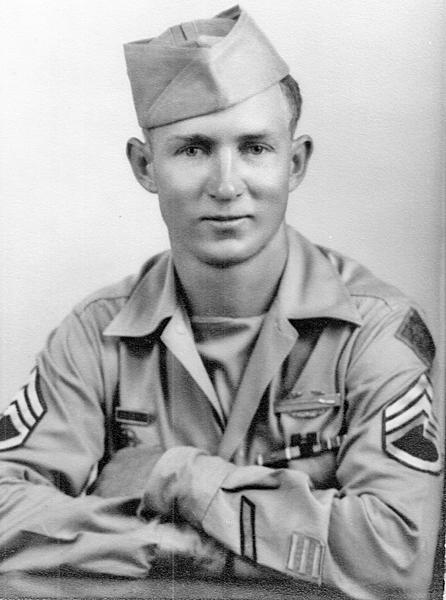
Staff Sergeant John
Henry Smith
Note the 4th Infantry Division shoulder sleeve insignia at the
top of his left sleeve
Courtesy of Amy Scarborough Hughes
John Henry Smith was born in
Chattooga County, Georgia on March 20, 1921, one of three sons
and a daughter
born to Mack and Cora Pearl Smith. He was known as Henry and as a
boy he worked with his father on a
one hundred acre farm raising corn, cotton, potatoes, peanuts and
vegetables. He learned how to use mules
and farm implements in the breaking of land and cultivation of
crops. Before entering military service he worked
at the Montezuma Drug Company in Montezuma, Georgia selling
items, making displays, taking inventories and at
the soda fountain in the store.
Henry was drafted into the Army
on July 23, 1942 and entered active duty on August 6, 1942 at
Fort McPherson, Georgia.
At the time of induction he indicated he had completed two years
of High School, listed his civilian occupation
as Sales Clerk / Waiter and he indicated that he was single
without dependents. He gave his home of residence as
Montezuma, Macon County, Georgia. His older brother Leonard Hoke
"Red" Smith was a truck driver and "decided
the military was a better career option for him then hauling
watermelons at the farmers market" ¹ so he volunteered
for the draft on February 22, 1941.
Beginning in August 1942 Henry
received approximately three months of Basic Training at Camp
Butner, North Carolina.
The date of Henry's assignment to the 22nd Infantry could not be
found but he most likely joined the Regiment
in 1942 at Camp Gordon, Georgia. He was promoted to Private First
Class in November 1942. Henry was awarded
the Good Conduct Medal as a Private First Class of Company C 22nd
Infantry in Headquarters 22nd Infantry
General Orders # 14, dated December 31, 1943 at Fort Jackson,
South Carolina. During training he qualified as a
Marksman both with the service rifle and also with the Browning
Automatic Rifle (BAR). He took amphibious training
with the Regiment at Camp Gordon Johnston, Florida and sailed
with the 22nd Infantry to England on January 18, 1944
aboard the Capetown Castle.
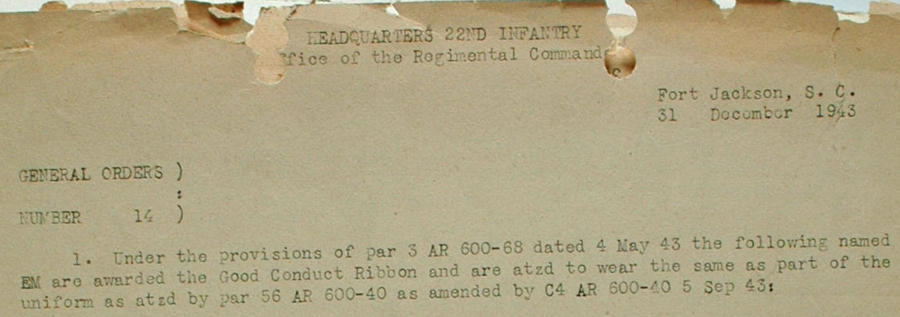
![]()
Above: Henry's name in
General Orders # 14 of the 22nd Infantry awarding him the Good
Conduct Ribbon.
At the end of the war it was renamed the Good Conduct Medal.
Courtesy of John Tomawski
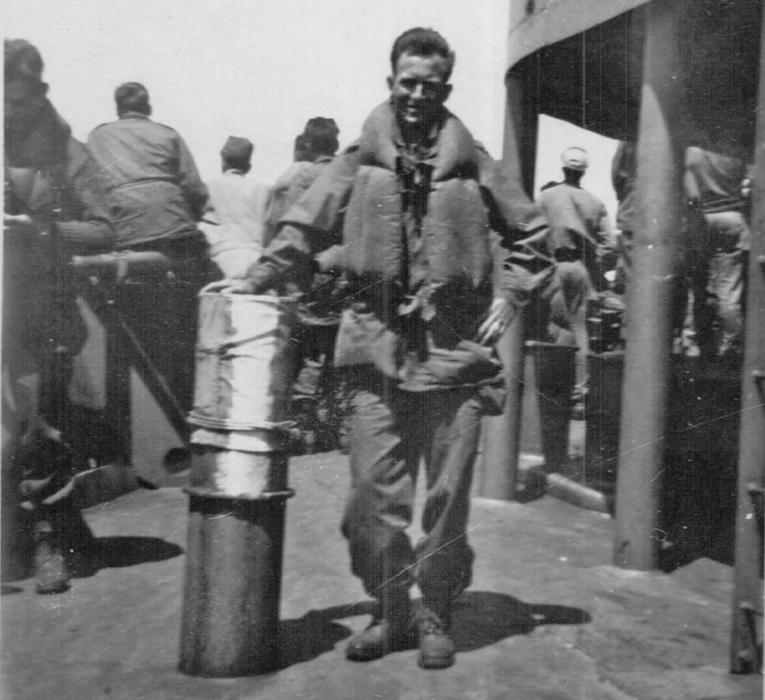
John Henry Smith aboard
ship. It is believed this was taken on the Capetown Castle
on the way to England in January 1944.
Courtesy of Amy Scarborough Hughes
After undergoing more training
in England with his Regiment he sailed across the English Channel
headed for
Normandy, France. He later recalled that he didn't sleep at all
the night before D-Day. Henry landed on Utah Beach
with Company C 1st Battalion 22nd Infantry in the second assault
wave on D-Day June 6, 1944. When talking about
the landing afterward he especially remembered the “green,
stagnant water that the invading GIs had to get through.”
Henry said "We didn't have no fighting on the first day;
they didn't expect us. The men further down the beach got it
pretty hard, but we got it the second day."
On June 7 his Battalion moved
through the villages of Ravenoville and St. Marcouf and attacked
the German coastal battery
at Crisbecq. They were met with strong resistance by the enemy
and in heavy fighting Henry was wounded
in both legs by shrapnel from German artillery. His wounds were
severe enough for him to be evacuated
back to England where he spent some time recuperating in a
hospital there.
While Henry was in the hospital
his brother Red was killed in action in Normandy on June 20, 1944
while serving as a Technician 5th Class in the 67th Armored
Regiment 2nd Armored Division.
Mack and Pearl Smith received two letters from the Army within a
few days of each another.
One told of Red’s death, the other told of Henry’s
injuries but did not go into detail. About a week later
they received a letter from Henry who was recuperating in the
hospital in England. ² Henry did not learn of his
brother's death until he returned to his unit in August.
Leonard Hoke "Red"
Smith is buried in Plot I Row 13 Grave 15,
Normandy American Cemetery, Colleville-sur-Mer, France.
|
Grave marker for Technician
Fifth Class Photo by Frogman from the Find A Grave website |
Henry returned to his Company
just in time to take part in the liberation of Paris. In later
years when he remembered Paris
he spoke of “Cognac being served from the side of the
road" and talked about riding on the back of a truck through
the city
while people on the streets cheered as they passed by. He took
part in the 22nd Infantry's first penetration into Germany
in September 1944 and was with Company C as it moved through
Belgium. Because of his leadership abilities in November
1944 he was promoted to Staff Sergeant and made a squad leader in
the Company.
He would later say "If we
hadn't had good training, there's no way any GI could have gone
through what we did.
We would dig a foxhole, and finish at midnight. Then we would be
on watch for two hours, and sleep for two hours.
Sometimes I would catch men asleep on a watch, but you couldn't
court martial them, because you wouldn't have
a company left. And they were so tired. If the upper echelon
could have gone through what we went through,
there wouldn't be any war."
In the battle of the Hürtgen
Forest, Germany on November 26, 1944 his Company was directed to
attack astride Road "B"
to clear the woods just west of the town of Grosshau. Company C
went up against strong resistance including point blank
artillery fire but pushed on and secured its objective by late
afternoon. Before dark a German counterattack supported by
self-propelled artillery hit Company C and drove it back to its
previous positions. The Company sustained heavy casualties
throughout the day and by the end of the day its effective
strength was down to just 20 officers and men.
Henry was one of Company C's
wounded that day, earning his second Purple Heart when a mortar
round sent shrapnel
into his left leg and killed the man beside him. He spent some 90
days in hospital recovering before rejoining his unit.
He returned to the front lines
as his Company attacked eastward and crossed the Prüm River
under fire. He said
"They'd get you well and send you back up there." When
he rejoined his unit there were only two men left in the Company
who had landed with him on D-Day. He pushed on with Company C
deeper into Germany until early May when he was
given a 45 day furlough back to the United States. He had enough
points to qualify for a discharge.
Henry arrived in the United
States on May 24, 1945. He was discharged from the Army at the
Separation Center
at Fort McPherson, Georgia on June 9, 1945. In July 1945 he was
awarded a disability pension from the
Veterans Administration due to wounds he incurred during his
World War II service.
Of the experience he said
"I wouldn't take a million dollars for it, and I wouldn't
take another million dollars
to go back through it."
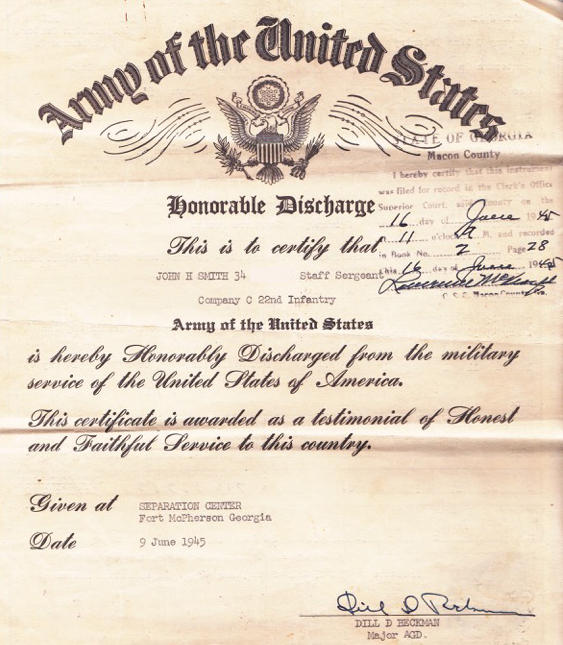
Honorable Discharge for Staff Sergeant John Henry Smith
Courtesy of Amy Scarborough Hughes
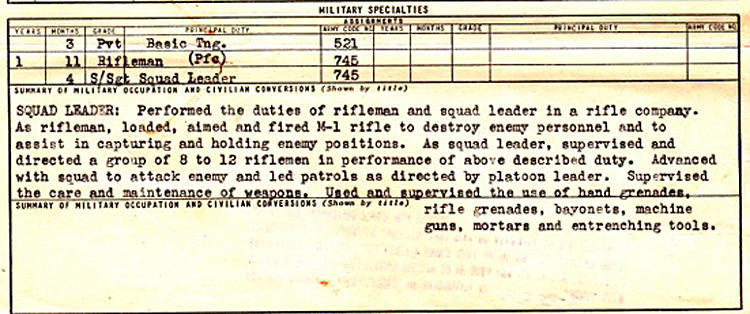
Above: The Army
Separation Qualification Record for John Henry Smith gave a
detailed account
of the kinds of duty he performed while serving in Company C 1st
Battalion 22nd Infantry
Courtesy of Amy Scarborough Hughes
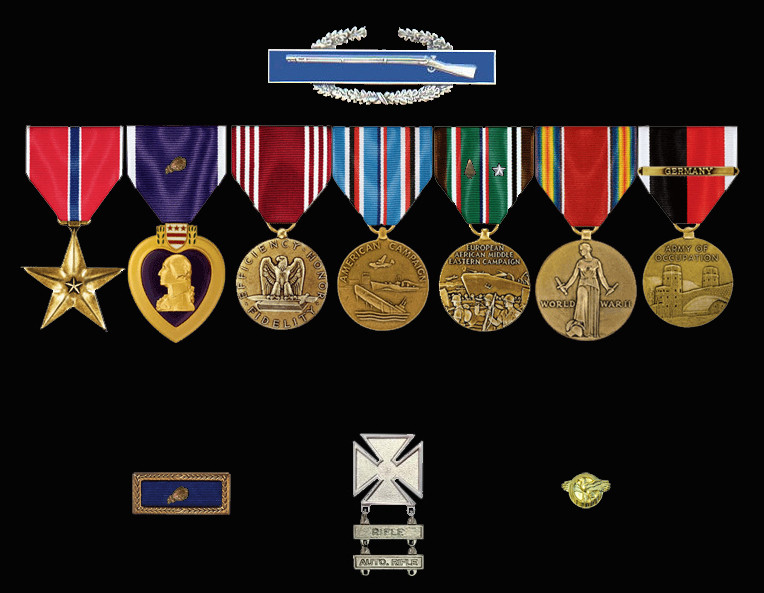
Decorations of Staff Sergeant John Henry Smith
He is also authorized the Belgian Fourragerre.
John Henry Smith married Dorothy
Lillian Athon on June 23, 1945 in Macon County, Georgia.
They became the parents of Carl Anthony Smith and Gail Smith.
Using the G.I. Bill Henry
studied carpentry. He worked as a carpenter for G.E. Bentley
contractors
for about eleven years. He owned and operated a full service gas
station for nearly fourteen years.
In 1970 he went to work in the insurance industry for Liberty
Mutual in Birmingham, Alabama
until he retired in 1981. In retirement he was able to return to
carpentry which he loved.
John Henry Smith died at the age
of 79 on January 22, 2001 and is buried in Bertha Dozier Memorial
Park Cemetery,
Montezuma, Macon County, Georgia. His wife Lillian died on
October 14, 2003 and is buried next to her husband Henry.
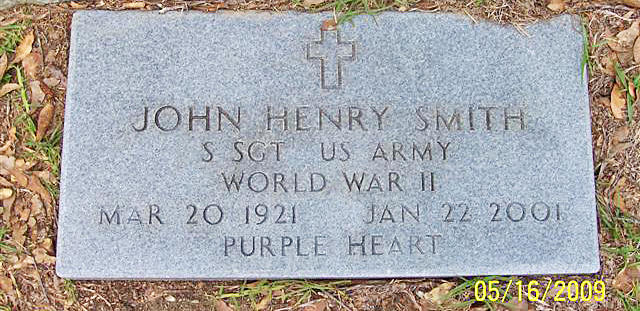
Grave marker for John Henry Smith
Photo by Amy Scarborough Hughes from the Find A Grave website
¹ As per conversation with Amy Hughes
² Ibid.----------------------------------
This page was prepared with the
assistance of Amy Scarborough Hughes, the granddaughter of
John Henry Smith who has lovingly preserved the documents and
memories of her
grandfather's service.
Home | Photos | Battles & History | Current |
Rosters & Reports | Medal of Honor | Killed
in Action |
Personnel Locator | Commanders | Station
List | Campaigns |
Honors | Insignia & Memorabilia | 4-42
Artillery | Taps |
What's New | Editorial | Links |